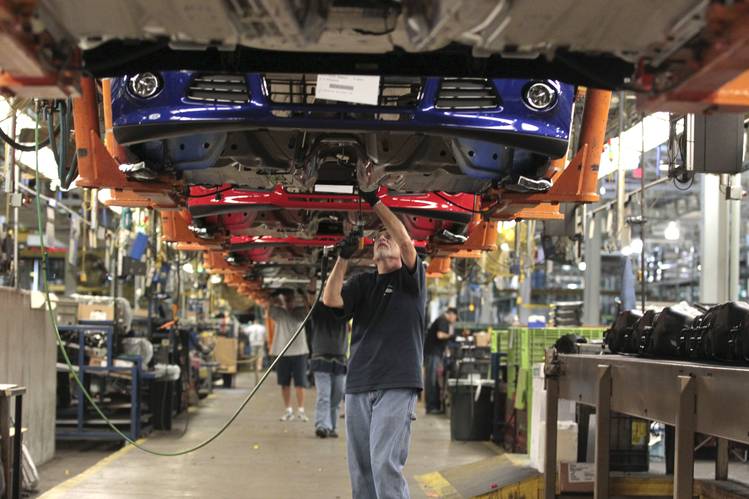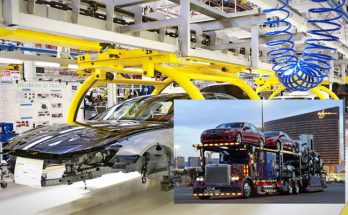Mexico auto industry 2017MEXICO CITY—By attacking the North American Free Trade Agreement, promising a U.S.-Mexico border wall and embracing protectionist policies, President Trump has managed to dent Mexico’s auto industry more than the final year. The Meineke Automobile Care and Econo Lube Co-Brand opportunity combines nearly 80 years of automotive and franchise leadership and practically 1,100 locations, delivering the ultimate company program in today’s automotive aftermarket. With the capacity to provide a quickly and convenient swift lube service and complete auto care, our co-brand centers are capable to meet and exceed the expectation of today’s consumers.
In light of this, it was foreseen (in a pre-Trump situation) that Mexican auto assembly capacity will much more than double in size in between 2010 and 2020. But US capacity will also grow 13 % to 14.2 million vehicles in the identical period. Therefore, in direct contrast to much prevailing opinion, the Center for Automotive analysis concluded that the US is not but losing substantial existing production to Mexico, but rather it is missing out on the incremental development and investment from carmakers and suppliers.
Mexico’s Auto Businessmexico automotive industry 2019
mexico automotive industry newsBenefits of Nearshoring in Mexico, Key Highlights and 2016 Market Overview. Certainly, Trump won the presidential election partly thanks to a surprisingly robust outcome in the Rust Belt states, which have a high share of employment in the automotive industry. Combine this with Trump’s clear fondness for manufacturing industries, and his ( rather dubious ) conviction that renegotiating trade offers will bring back” hugely-paid skilled jobs, then it is clear that the automotive sector will be a key region of contention in between the USA and Mexico.
Contrary to production (largely driven by export prospects), automotive registration numbers have been weak. In 2017, vehicle registration shrunk by 4.6% year-on-year, driven by the weakening of macroeconomic fundamentals. The inflation rose to six.eight% at the year end of 2017 (a sixteen-year record high) and the benchmark interest price was lifted by 450 basis points given that December 2015 (reaching 7.five% a year in February 2018). According to the Mexican Association of Automotive Distributors (AMDA), the number of automotive sales made by way of financing declined by two.6% in 2017: a fall equivalent to 27,721 automobiles. Moreover, the uncertainties connected to Mexico’s presidential elections (scheduled for 1st July 2018) and to NAFTA’s renegotiation are likely to have influenced household consumption decisions.
In light of these developments, Mexico became the world’s 7th biggest vehicle producer and the most important in Latin America. More than 80 percent of the production of cars is devoted to export, which makes it the world’s 4th largest automobile exporter, behind Germany, Japan, and South Korea. Information collected by the Mexican Automobile Market Association show that 70.two% of Mexican automobile exports went to the US (in Q1 of 2015). Mexico is now the USA’s 2nd largest vehicle supplier after Canada, take the spot that Japan had occupied given that 1970.
Mexico’s Auto Sector Summit (Nov 2019), Monterrey Mexicomexico automotive industry 2016
mexico automotive industry 2017Positive aspects of Nearshoring in Mexico, Key Highlights and 2016 Sector Overview. John D. Rockefeller is a founder of the Standard Oil Organization, became one of the world’s wealthiest guys and a main philanthropist. Born in upstate New York, he entered the then-fledgling oil company in 1863 by investing in a Cleveland, Ohio, refinery. In 1870, he established Regular Oil, which by the early 1880s controlled some 90 % of U.S. refineries and pipelines. Critics accused Rockefeller of engaging in unethical practices, such as predatory pricing and colluding with railroads to get rid of his competitors, in order to gain a monopoly in the business. In 1911, the U.S. Supreme Court found Regular Oil in violation of anti-trust laws and ordered it to dissolve. Throughout his life Rockefeller donated more than $500 million to different philanthropic causes.
7 Ford was able to avoid the bailout despite its large debt, but even so, the collapse of GM and Chrysler would have sealed its own debacle, so it promoted the bailout all round. This established how extraordinarily inter-dependent the North American automotive market has turn into within and across its complete chain i.e., from producers to suppliers, from distributors to buyers, and so on. The bailout, an unprecedented financial intervention in the billions, was a “matter of state” to the Obama administration, considering that a collapse of the “Large Three” would have meant the failure of some of the most emblematic firms of U.S. capitalism and jeopardized the 1.6 million jobs straight linked to the market. For an insider view of the bailout, see rattner (2010), written by the 1st head of the Presidential Task Force on the Auto business Obama designed.
The Mexican economy has a treasure, which is its automotive industry. It attracts the interest and capital of the world’s significant assemblers. This is not only due to the high quality and innovation that goes into what it produces but also its skilled and productive labor. What’s more, geographic proximity to the United States indicates decrease transport fees and on-time delivery.
Mexico Automotive Getting The Deal By way of GTDTmexico automotive industry growth
mexico automotive industry 2016Positive aspects of Nearshoring in Mexico, Key Highlights and 2016 Sector Overview. The Mexican automotive industry and economy is now the world’s quickest increasing manufacturing cluster. The Mexican auto sector is not only gaining recognition inside the manufacturing realm but has also contributed generously to Mexico’s economy. Numerous auto manufacturers in Mexico rely on obtaining their operations in Mexico for low labor expense and top quality auto production. With over four hundred various vehicle models and forty-two different automakers, Mexico could now be considered 1 of the most diverse automotive production markets in the planet. The auto manufacturing business in Mexico is expected to enhance further in the future.
Scottish-born Andrew Carnegie (1835-1919) was an American industrialist who amassed a fortune in the steel business then became a significant philanthropist. Carnegie worked in a Pittsburgh cotton factory as a boy ahead of rising to the position of division superintendent of the Pennsylvania Railroad in 1859. Whilst operating for the railroad, he invested in a variety of ventures, including iron and oil businesses, and produced his first fortune by the time he was in his early 30s. In the early 1870s, he entered the steel enterprise, and more than the subsequent two decades became a dominant force in the market. In 1901, he sold the Carnegie Steel Firm to banker John Pierpont Morgan for $480 million. Carnegie then devoted himself to philanthropy, at some point giving away more than $350 million.
Unifor Canada is standing behind striking workers in the Mexican border city Matamoros, exactly where tens of thousands of auto parts and plastics plant staff walked off the job last week in an action that business groups say is costing US$50 million per day. Fischer S.A. de C.V. Fischer began as a joint venture but now is Mexican-owned, with injection molding and extrusion blow molding. It is expanding to operate far more closely with the auto sector.





